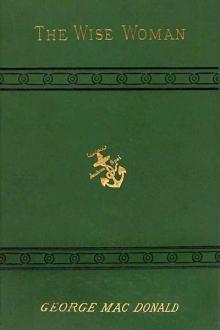The Wise Woman, George MacDonald [epub e ink reader TXT] 📗

- Author: George MacDonald
- Performer: -
Book online «The Wise Woman, George MacDonald [epub e ink reader TXT] 📗». Author George MacDonald
She stood silent for a moment, to see what effect her words might have. But Rosamond only said to herself,—
“She wants to fatten and eat me.”
And it was such a little while since she had looked into the wise woman’s loving eyes, thrown her arms round her neck, and kissed her!
“Well,” said the wise woman, gently, after pausing as long as it seemed possible she might bethink herself, “I must tell you then without; only whoever listens with her back turned, listens but half and gets but half the help.”
“She wants to fatten me,” said the princess.
“You must keep the cottage tidy while I am out. When I come back, I must see the fire bright, the hearth swept, and the kettle boiling; no dust on the table or chairs, the windows clear, the floor clean, and the heather in blossom—which last comes of sprinkling it with water three times a-day. When you are hungry, put your hand into that hole in the wall, and you will find a meal.”
“She wants to fatten me,” said the princess.
“But on no account leave the house till I come back,” continued the wise woman, “or you will grievously repent it. Remember what you have already gone through to reach it. Dangers lie all around this cottage of mine; but inside, it is the safest place—in fact the only quite safe place in all the country.”
“She means to eat me,” said the princess, “and therefore wants to frighten me from running away.”
She heard the voice no more. Then, suddenly startled at the thought of being alone, she looked hastily over her shoulder. The cottage was indeed empty of all visible life. It was soundless, too; there was not even a ticking clock or a flapping flame. The fire burned still and smouldering-wise; but it was all the company she had, and she turned again to stare into it.
Soon she began to grow weary of having nothing to do. Then she remembered that the old woman, as she called her, had told her to keep the house tidy.
“The miserable little pig-sty!” she said: “Where’s the use of keeping such a hovel clean?”
But in truth she would have been glad of the employment, only just because she had been told to do it she was unwilling; for there are people—however unlikely it may seem—who object to doing a thing for no other reason than that it is required of them.
“I am a princess,” she said, “and it is very improper to ask me to do such a thing.”
She might have judged it quite as suitable for a princess to sweep away the dust as to sit the centre of a world of dirt. But just because she ought, she wouldn’t. Perhaps she feared that if she gave in to doing her duty once, she might have to do it always—which was true enough—for that was the very thing for which she had been specially born.
Unable, however, to feel quite comfortable in the resolve to neglect it, she said to herself, “I’m sure there’s time enough for such a nasty job as that!” and sat on, watching the fire as it burned away, the glowing red casting off white flakes, and sinking lower and lower on the hearth.
By and by, merely for want of something to do, she would see what the old woman had left for her in the hole of the wall. But when she put in her hand she found nothing there, except the dust which she ought by this time to have wiped away. Never reflecting that the wise woman had told her she would find food there when she was hungry, she flew into one of her furies, calling her a cheat, and a thief, and a liar, and an ugly old witch, and an ogress, and I do not know how many wicked names besides. She raged until she was quite exhausted, and then fell fast asleep on her chair. When she awoke, the fire was out.
By this time she was hungry; but without looking in the hole, she began again to storm at the wise woman, in which labour she would no doubt have once more exhausted herself, had not something white caught her eye: it was the corner of a napkin hanging from the hole in the wall. She bounded to it, and there was a dinner for her of something strangely good—one of her favourite dishes, only better than she had ever tasted it before. This might surely have at least changed her mood towards the wise woman; but she only grumbled to herself that it was as it ought to be, ate up the food, and lay down on the bed, never thinking of fire or dust, or water for the heather.
The wind began to moan about the cottage, and grew louder and louder, till a great gust came down the chimney, and again scattered the white ashes all over the place. But the princess was by this time fast asleep, and never woke till the wind had sunk to silence. One of the consequences, however, of sleeping when one ought to be awake, is waking when one ought to be asleep; and the princess awoke in the black midnight, and found enough to keep her awake. For although the wind had fallen, there was a far more terrible howling than that of the wildest wind all about the cottage. Nor was the howling all; the air was full of strange cries, and everywhere she heard the noise of claws scratching against the house, which seemed all doors and windows, so crowded were the sounds, and from so many directions. All the night long she lay half swooning, yet listening to the hideous noises. But with the first glimmer of morning they ceased.
Then she said to herself, “How fortunate it was that I woke! They would have eaten me up if I had been asleep.” The miserable little wretch actually talked as if she had kept them out! If she had done her work in the day, she would have slept through the terrors of the darkness, and awaked fearless; whereas now, she had in the storehouse of her heart a whole harvest of agonies, reaped from the dun fields of the night!
They were neither wolves nor hy�nas which had caused her such dismay, but creatures of the air, more frightful still, which, as soon as the smoke of the burning fir-wood ceased to spread itself abroad, and the sun was a sufficient distance down the sky, and the lone cold woman was out, came flying and howling about the cottage, trying to get in at every door and window. Down the chimney they would have got, but that at the heart of the fire there always lay a certain fir-cone, which looked like solid gold red-hot, and which, although it might easily get covered up with ashes, so as to be quite invisible, was continually in a glow fit to kindle all the fir-cones in the world: this it was which had kept the horrible birds—some say they have a claw at the tip of every wing feather—from tearing the poor naughty princess to pieces, and gobbling her up.
When she rose and looked about her, she was dismayed to see what a state the cottage was in. The fire was out, and the windows were all dim with the wings and claws of the dirty birds, while the bed from which she had just risen was brown and withered, and half its purple bells had fallen. But she consoled herself that she could set all to rights in a few minutes—only she must breakfast first. And, sure enough, there was a basin of the delicious bread and milk ready for her in the hole of the wall!
After she had eaten it, she felt comfortable, and sat for a long time building castles in the air—till she was actually hungry again, without having done an atom of work. She ate again, and was idle again, and ate again. Then it grew dark, and she went trembling to bed, for now she remembered the horrors of the last night. This time she never slept at all, but spent the long hours in grievous terror, for the noises were worse than before. She vowed she would not pass another night in such a hateful haunted old shed for all the ugly women, witches, and ogresses in the wide world. In the morning, however, she fell asleep, and slept late.
Breakfast was of course her first thought, after which she could not avoid that of work. It made her very miserable, but she feared the consequences of being found with it undone. A few minutes before noon, she actually got up, took her pinafore for a duster, and proceeded to dust the table. But the wood-ashes flew about so, that it seemed useless to attempt getting rid of them, and she sat down again to think what was to be done. But there is very little indeed to be done when we will not do that which we have to do.
Her first thought now was to run away at once while the sun was high, and get through the forest before night came on. She fancied she could easily go back the way she had come, and get home to her father’s palace. But not the most experienced traveller in the world can ever go back the way the wise woman has brought him.
She got up and went to the door. It was locked! what could the old woman have meant by telling her not to leave the cottage? She was indignant.
The wise woman had meant to make it difficult, but not impossible. Before the princess, however, could find the way out, she heard a hand at the door, and darted in terror behind it. The wise woman opened it, and, leaving it open, walked straight to the hearth. Rosamond immediately slid out, ran a little way, and then laid herself down in the long heather.
CHAPTER V.
The wise woman walked straight up to the hearth, looked at the fire, looked at the bed, glanced round the room, and went up to the table. When she saw the one streak in the thick dust which the princess had left there, a smile, half-sad, half-pleased, like the sun peeping through a cloud on a rainy day in spring, gleamed over her face. She went at once to the door, and called in a loud voice—
“Rosamond, come to me.”
All the wolves and hy�nas, fast asleep in the wood, heard her voice, and shivered in their dreams. No wonder then that the princess trembled, and found herself compelled, she could not understand how, to obey the summons. She rose like the guilty thing she felt, forsook of herself the hiding-place she had chosen, and walked slowly back to the cottage she had left full of the signs of her shame. When she entered she saw the wise woman on her knees, building up the fire with fir-cones. Already the flame was climbing through the heap in all directions, crackling gently, and sending a sweet aromatic odour through the dusty cottage.
“That is my part of the work,” she said, rising. “Now you do yours. But first let me remind you that if you had not put it off, you would have found it not only far easier, but by and by quite pleasant work, much more pleasant than you can imagine now; nor would you have found the time go wearily; you would





Comments (0)